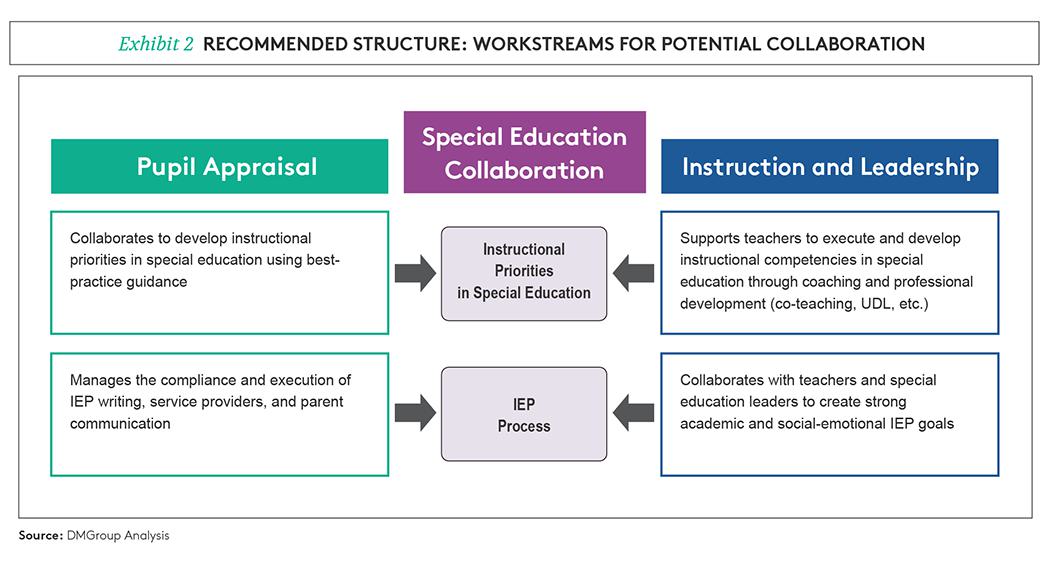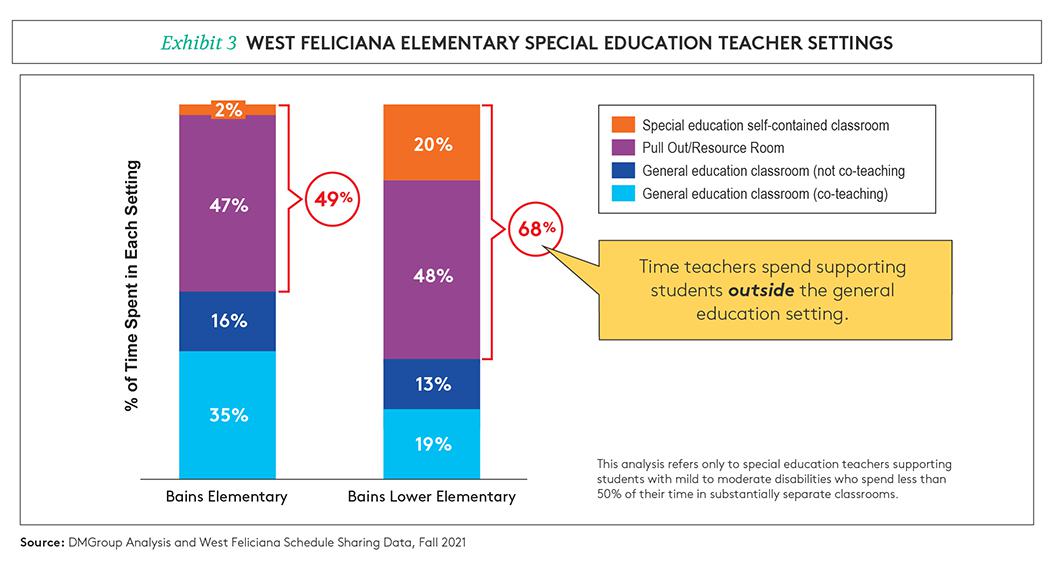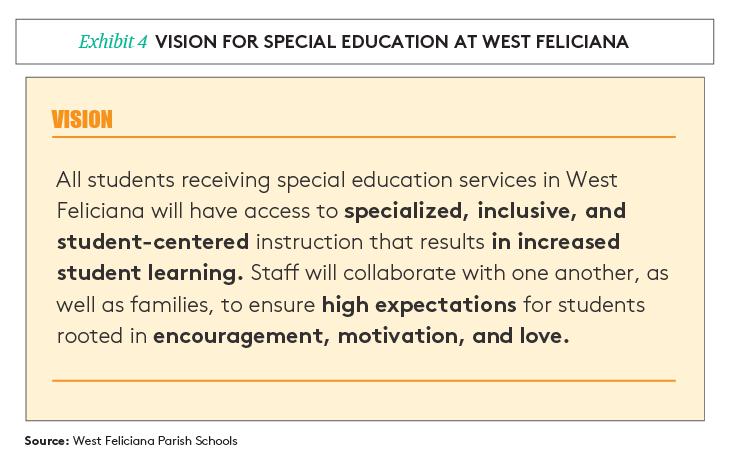The following is an excerpt from DMGroup's Special Education Opportunity Review conducted for West Feliciana Parish Schools (LA).
Read the full case study
As classroom closures continued during the 2021-2022 school year and the detrimental impacts of remote learning became more apparent, West Feliciana Parish Schools (West Feliciana) was pleased to learn that their overall student achievement was actually improving steadily, as evidenced by standardized testing results. Additionally, the district had just received the highest score of any district in Louisiana on its state report card.
However, a closer look at the standardized testing data revealed that the gap between students with and without disabilities was far wider than that of the state - 35 percentage points in West Feliciana compared to 22 percentage points at the state level (Exhibit 1).

In August 2021, West Feliciana launched a Special Education Opportunity Review with District Management Group to analyze the district's current practices, compare them to best practices, and identify solutions for improving special education.
Special Education Opportunity Review Provides a Deep Look
For important work like a Special Education Opportunity Review to be conducted thoroughly and have impact, DMgroup believes it is essential to identify a diverse group of stakeholders to champion the work. The district formed a 13-member guiding coalition to be involved in the entire process, from gathering information to holding discussion with the appropriate stakeholders to prioritizing the findings and turning them into action in the district. The guiding coalition included the Superintendent, Director of Special Education, Director of Accountability, special education staff, school leaders, related service providers, and general education teachers.
DMGroup began conducting a robust quantitative analysis of existing district data that included
academic, social-emotional and special education–specific data. A comprehensive qualitative analysis of the strengths and challenges of a school district through one-on-one interviews with district-level leaders helped paint a more detailed and nuanced picture of the different tiers of intervention embedded in each school and in the daily practices of teachers.
Another key part of DMGroup’s analysis involves gathering detailed information about how students are served. Deep insights are garnered by collecting information about a typical week’s schedule from all staff who support students with disabilities. DMgroup asked 105 of West elician’s staff members across 13 roles to log their activities and responsibilities for one full week using DMGroups easy-to-use, proprietary schedule-sharing software. This data helped provide great insight into how students are being supported.
Findings & Recommendations
Highlights of findings and recommendations for West Feliciana were as follows:
Recommendation #1: Capitalize on District Strengths
Part of any Special Education Opportunity Review includes assessing and understanding the current strengths of the distinct. Not only is it important to acknowledge the good work that is being done, but an identification of strengths allows districts to capitalize on them as they make a plan to move forward. In West Feliciana, the following strengths were highlighted in DMGroup’s analysis to capitalize on: (1) strong learning mindset; (2) strong intervention practices already in place; and (3) strong overall student achievement.
Recommendation #2: Establish a Clearly Articulated Shared Vision
Despite a lot of accomplishments supporting students with disabilities, DMGroup identified that the district had a high level of principal autonomy and lacked a unified vision for special education and student supports.
The DMGroup stressed the need to articulate a clear, shared vision and district-wide priorities so that programming can better meet the needs of students with significant learning disabilities.
Recommendation #3: Clarify District Roles and Responsibilities and Collaboration Structures
In West Feliciana, as in many districts across the country, general education efforts and special education or student support efforts were housed in two separate departments at both the district and school levels, and lacked a close collaboration. Moreover, the professional development of general education and special education teachers was happening separately.
DMGroup’s recommendation included creating and incorporating key collaboration structures for these two departments in order to make sure that knowledge and priorities were shared across them (Exhibit 2).

Recommendation #4: Appoint a Building-Level Special Education Coordinator
The qualitative analysis revealed that general education leaders and teachers lacked access to key knowledge, development, and critical updates about special education.
DMGroup recommended appointing a building-level special education leader as a liaison between central office staff and school staff to provide guidance on special education and student services–related issues. This person is typically a veteran special education teacher who already has strong relationships with their colleagues in their school building.
Recommendation #5: Develop a Communication Plan
Another resounding theme that arose primarily in one-on-one interviews and focus groups was the staff’s desire for stronger communication from the central office about special education updates.
DMGroup recommended systemic changes in district leadership's approach to communicating special education updates, based on best-practice techniques in management.
Recommendation #6: Create a Special Education Professional Development Arc for All Staff
The district lacked ongoing training for special education staff or their general education counterparts on topics of special education.
For the district to truly support diverse learners, DMGroup recommended using a framework of high-leverage practices from the Council on Exceptional Children that includes development for all staff on collaborative practices, assessment, social-emotional well being, and instruction.
Recommendation #7: Prioritize Inclusion
DMGroup’s schedule-sharing analysis discovered that students with disabilities were spending more than half of their time outside of the general education classroom (Exhibit 3).

DMGroup recommended to keep students receiving special education services in core subject instruction and to provide teachers with more co-teaching training, aimed at helping special education teachers to support students effectively within the general education setting.
DMGroup also recommended the implementation of DMSchedules for Special Education scheduling software, which enables districts to easily build schedules that meet their special education objectives and instructional priorities.
Recommendation #8: Bolster Content Expertise at the Secondary Level
At the secondary level, a different set of challenges existed for supporting students with disabilities. The insights showed that 100% of high school special education teachers were supporting two or more subjects throughout the day which did not allow them to develop true content expertise or co-plan with classroom teachers.
In order to improve content mastery, DMGroup advised that special education teachers support at most two subjects, if not one, and identify current co-teaching staff who could serve as model teachers or teacher coaches in order to strengthen the co-teaching model.
Prioritizing the Highest-Impact and Most Feasible Recommendations
After sharing the recommendations, DMGroup worked with the coalition to articulate a shared vision for addressing the needs of students receiving special education services (Exhibit 4).

To make our findings as actionable as possible DMGroup’s Special Opportunity Review always includes a multi-step prioritization workshop to identify which findings will be the most impactful and feasible for the district, and then to chart a course forward. Working with the district, the following priorities were identified:
Appoint a building-level special education coordinator;
Revamp the professional development calendar to include more opportunities for development on special education topics;
Clarify the central office staff's roles and responsibilities related to special education and teaching and learning.
A Year Later
One year later, Superintendent Milton reflects on the impact of the Special Education Opportunity Review: “It took the opinions and subjectivity out of it and gave our current practice more objectivity, which I think was transformational. District Management Group had the data, knew best practices from the research and their work with other districts, and took a very humanistic approach to that data.”
Superintendent Milton shared that the district was able to hire a building-level special education coordinator which resulted in higher levels of alignment in the district on practices in special education.
Armed with a robust set of findings, a vision for special education programming, and a dedicated set of leaders and teachers, West Feliciana Parish Schools continues to hone its approach to support students with the greatest learning needs with a sense of urgency that drives results. “It’s not only tackling the learning loss of the pandemic, but then addressing those long standing issues that were happening before the pandemic, and District Management Group was a huge part of our solutions process,” shared Superintendent Milton.

